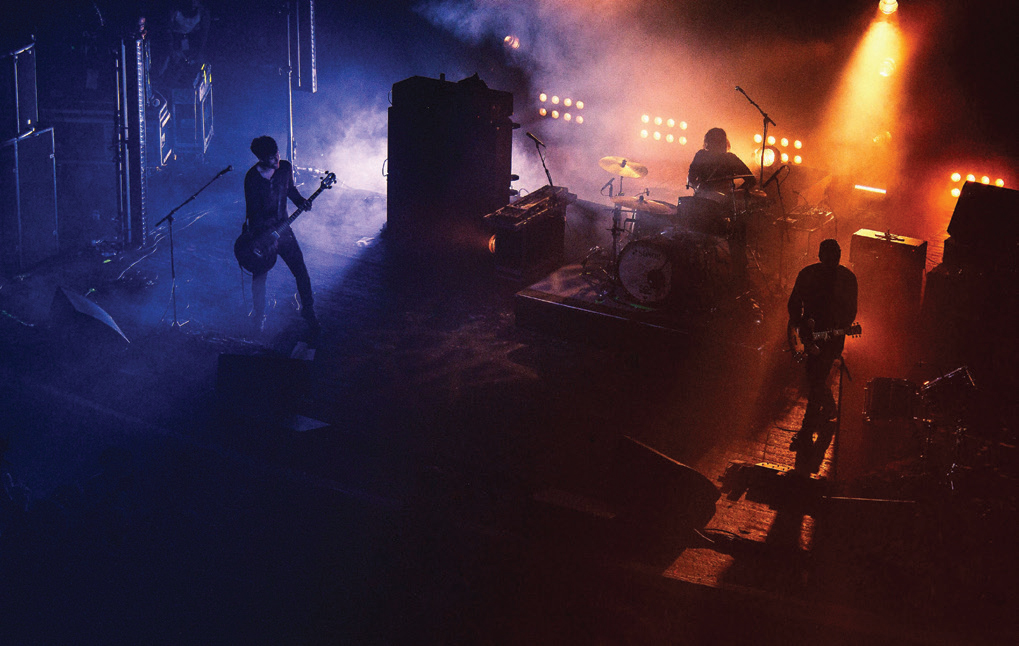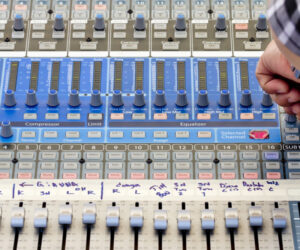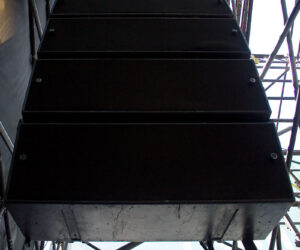Right now, at least in my opinion, touring is far from the cakewalk we all hoped it would be post-pandemic. There have always been challenges, a certain amount of stress and exhaustion, but – even now – that’s offset by the satisfaction of running away with the circus for a weekend, a month, or more.
One of the things making it more challenging is that so many people have left the road behind for more stable, hopefully pandemic-proof, work, which sometimes leaves bands, particularly mid-sized acts doing a few far-flung one-offs or “twofers” thousands of miles apart, scrambling to find crew. I know this because that’s how I’ve spent the summer with my band, Moist. (I know, terrible name. Let’s just say it seemed like a good idea in the 90s.)
So, there are a huge number of acts out there trying to make up for lost time and revenue, and our go-to crew only has so much time available to work with us. All of this got me thinking about what musicians (and management, frankly) should look for in terms of their qualities and skill sets.
Checking The Boxes
When it comes to front of house and monitors, aside from having the skill and experience to do the job, being patient, proactive, and able to play well with others are at the top of the list. Granted, generally speaking, that’s what musicians (and everyone on tour, crew included) are looking for in general.
I know this because I often discuss it with my band’s go-to, long-time, long-suffering FOH engineer/tour manager Matt Lamarche. One of the issues – and by no means something that’s an exclusively post-pandemic problem – is that bands and management often ask more from technicians to cut costs. But asking someone to take on two or more roles when you want them to concentrate on one role means something will get less attention.
That doesn’t mean it’s unworkable or impossible, mind you, but it’s unrealistic to think otherwise. To that end, we’ll add highly developed time-management, troubleshooting, and interpersonal skills as key to all those positions.
Matt: “I always take on too much.”
Me: “Yeah. But you rarely seem angry or flustered.”
Matt: “I’m a very patient person, I think. Temperament has a lot to do with it. Some guys blow a gasket but yelling at people doesn’t get things solved. They leave thinking, ‘That guy’s a jerk’.”
And we all know that’s the wrong impression to leave behind.

Usually, our technicians/engineers have far more one-on-one time with local crew, venue management, promoters, etc., and often, that makes a bigger impression than how an artist acts. I’ve rolled into a venue and started chatting with the house crew about how great a time “X show by X artist” was and how professional their crew was when they played a few days before.
When those comments are followed up by, “But the (insert artist or band member’s name or instrument here) was an absolute jerk,” somehow, more often than not, they still remember the show (mostly) favorably. My experience is that if the “jerk” was the person doing their job, or a related position, they tend to be less forgiving.
Matt: “That reflects on the band. It doesn’t matter how pro or nice the band is. When you have people who don’t know how to treat others properly and try to work with people and compromise, that’s when everybody has a terrible experience.”
When & How
Diplomacy is key. The last thing you want on tour is someone whose default setting is confrontational. (Too often, there’s already enough of that on stage with band members). A calm, measured approach helps everyone get more done more quickly and – yeah, it’s selfish – means less stress for me.
Still, there are times when someone has to bring the hammer down if things start going sideways. For example, if the house system is in such bad shape, it’s making the show next to impossible (been there) or if there’s a safety issue that’s being ignored (done that).
The key is to do so in a way that prompts immediate recognition that things have become serious and need to be addressed without hesitation, waffling, or reluctance. Whether that means a console is pooched and another must be provided post haste, or that no one can leave the bus because two band members narrowly escaped death after crawling under a train just as it got underway to get some snacks from an all-night convenience store on the other side of the tracks.
Knowing when and how to lower the boom and do so effectively and diplomatically is critical. Get people on your side, and they’re willing to help you. In addition to mixing/technological/workflow chops and experience, excellent communication skills, patience, attention to detail, and hustle go a long way to making the band view you as indispensable.
Musicians take note – the local folks may give you a pass if only because they expect you to be a bit of a freak show anyway, but if you can’t be accommodating enough to be decent to someone – whether they’re in-house techs, loaders, or your own people, that’s gonna leave a mark.
The easiest way to sum up my preferences here is to single out Matt as an example. I rarely see him upset. He may be, but as far as the band knows, everything’s in hand and proceeding as well as possible. He has a way of making the band feel comfortable while encouraging them (and everyone else working the show) to be proactive and sort out any minor issues on their own to keep the day moving along at speed.
If we don’t need to know about something, he’s not going to bring it up and then face a million questions from one of the guys in the band. If we do, he will. That kind of “just a heads up” communication goes a long way to alleviating on-stage anxiety. He’ll also give us an unvarnished assessment of what challenges we’ll be facing that day, whether he’s on the gig physically or only advanced it and knows the issues from past experience. Always with the caveat “but you never know.”
Case in point is a festival we played a few years back with more than a few quirks. Matt’s assessment was shared with the band, management, and our engineers/techs well ahead of time: “It’s a sh-t show.” As usual – spot on – there were boatloads of technical issues, somewhat resentful cooperation, and delayed set times for everyone.
The long of it – it seems wrong to use the word short in the context of this particular gig – was a stop and start sound check that (I kid you not) stretched out for six-plus hours. Painful, but something we pretty much knew was coming and a situation mitigated by the diligent, diplomatic efforts of an outstanding stage/backline tech that was touring with us. (I’m not going to get into the benefits and qualities I look for in someone taking that position here. That’s a whole ‘nother story I’ll address at another time).
The Art Of Communication
Another quality I greatly admire in a FOH and monitor engineer is the willingness to engage in a dialogue when something on stage – be that punishing stage volume, poorly EQ’d keyboard sounds, or a singer who insists on cupping the mic – is interfering with house sound.
Preferably they’ll communicate and work with the players to nip bad habits in the bud and/or tweak problematic issues. But I’m also happy if they speak up when faced with that peculiar intransigence that musicians exhibit when asked to turn down, tweak a setting, or what have you.

For example, a particularly bossy Wurly patch I’ve used for years that, in the low register, gets quite “boomy” but generally, since I only spend a bit of time in that register, fits most songs it’s used in well. When it doesn’t, Matt deals with it on the fly. It’s a compromise that takes into account the pros/cons of the sound, limitations of the hardware generating it, and the sound out front. If I start wailing away on it, he’ll pull me back substantially in the mix. I know that if I play with appropriate expression, it won’t be a problem where it shouldn’t be.
Matt knows the quirks of the personalities and styles of the band and of the gear we use. I trust he knows the same about the room and the system in play. I’ll never know exactly what the gig sounds like out front. I trust him because I know he has our back.
Another thing that inspires confidence is a FOH engineer who can be diplomatic but firm with backseat mixers – whether a band member, management, or some halfwit in the crowd who thinks the guitar should obliterate everything else.
Arguably, the dialogue between musician and monitor engineer is even more critical. The more effective an ME communicates, the more likely the gig will be pleasant all around. To that end, when touring without our regular monitor engineer, I like to introduce myself cheerily by saying, “Hi. I’m Kevin. I’m going to be a pain in your butt for the next half hour or so.” Hey, it’s a good icebreaker and is always taken in the spirit I intended.
Whether it’s our first date or not, I like an ME who takes charge when the band is flailing around, noodling, asking for things willy-nilly, and/or generally causing chaos – I’m as guilty as anyone else. Maybe more. The tighter the ship, the smoother the process, particularly when we don’t have a pre-existing file for our mix and the ME is working from scratch.
Also, I love an ME who actively mixes during the show to make everything better for us – if, and only if – they’ve worked with us previously. Matt, as he does, puts this more bluntly to house MEs, “Don’t mix the show for yourself. Get it to where the band’s happy.”
Those who do that successfully seem to me to be the folks who know not only the rig and quirks of the stage inside and out but, again, communicate effectively. Offering up information as we go along those lines, like, ‘hey, just so you know, the subs are right underneath you – I’m gonna pull back some low end.’ Generally, I like an ME with a friendly, small-town doctor sort of bedside manner, but I’ll gratefully take grumpy and curt if it gets the job done.
Regardless of the position they’re playing, I’m most comfortable with people who will solve any issues they can without making the band aware of them but will let us know if need be. And, critically, they aren’t timid about taking a firm hand with the band if need be to get the space and quiet time to sort any issues out. As a notorious sound check noodler myself, being told to shut up and find somewhere else to be doesn’t hurt my feelings.
Knowing when to step back and ask for help is also crucial. If the rig is new – I’ve come across this a few times – and you’re still getting up to speed on it, just let everyone know. Step back if you must, let someone who knows the gear step in, or call someone for support. Someone who tries to find solutions rather than throwing their hands up and saying, “that’s how it’s going to be” – even if that’s ultimately the result – makes everyone feel that much better even when things are headed south.
Moving Forward
Managing people well – musicians, other technicians, artist management – in my experience results in problems getting solved more quickly, with everyone feeling like they’re on the same page and having a good idea of when, and if necessary, how that will happen.
Finally, I’ll defer to Karl Winkler, who in an article that featured a while back in this publication, said: “The most important thing in the world is what is happening on stage right now. Never let your attention go somewhere else (pretty girl or guy, your phone, all the blinking lights, etc.) If someone is walking up to a solo mic or trying to get your attention from the stage, you need to know and react in real-time, not 30 seconds later after someone runs up yelling at you.”















